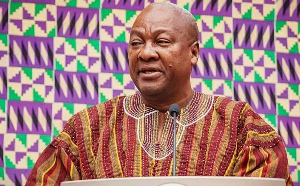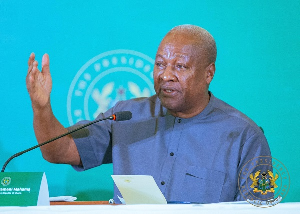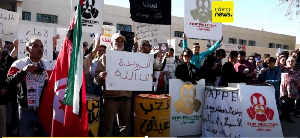A GNA feature by Boakye-Dankwa Boadi
Accra, May 7 - GNA - It was incredible to see a cockroach dancing at the court of chickens so gracefully that one thought for a moment that Providence had reversed the sequence of events and was playing the game the other way round.
However, it was meant to prove what our Elders have been saying all the time - tefre nim asa na enso akoko antwiwaa na ama ye ahunu na asa - to wit "the cockroach knows how to dance but the chicken did not allow it to display its agility on the dancing floor".
And so it happened on a Friday night that a President took time off his busy schedule to make history by becoming the first sitting Ghanaian President to attend a Ghana Journalists Association(GJA) Awards Night that happened to be the eleventh.
Members of the Association were overwhelmed to see a President, whom some of their members had maligned relentlessly, dancing so gracefully at the Ghana Journalists Association Awards Night. Indeed members of the Association hailed President John Agyekum Kufuor for his rapprochement.
A commentary on the Ghanaweb said it all: "Kufuor is simply wonderful. Such a GOD-SENT President is hard to find in Africa. He defies everything about an African President...
"Today we have a President, who could brace all the criticisms and attend a GJA awards night. It tells us that President Kufuor is a mature gentleman, who knows the pivotal role of journalists in nation building. He knows that for Ghana to make any headway our leaders should have clear conscience and should be able to swallow criticisms.
"Such is the mark of a modern great leader."
The Ghana New Agency reported: "President Kufuor, the first Head of State of Ghana to honour the invitation of the GJA to attend the annual prestigious ceremony said journalists should extol to the public the finer aspects of the national cultural heritage to enable society to be filled with hope and a general sense of purpose and optimism about a nation strengthened in unity.
"In so doing, journalists will also help the citizenry to develop and crystallise within their national psyche, a national orientation based on self-confidence, can-do-it attitude and the will to succeed despite seemingly impregnable obstacles."
The President, who lauded the Media as the Fourth Estate of the State, noted that journalists should redefine their pivotal purposes and rules of engagement, adding that members of the GJA should commit themselves to national development as their top most priority. "We must stress the word national to bring into focus the competitive world in which Ghana must grow," he said.
President Kufuor, who used his address to define the mandate of the Ministry of Information and National Orientation, said the aim was to help Ghanaians to overcome the characteristic attitude of resignation and the crab of the pull-him-down syndrome.
"It will motivate and energise us as a people to kick-start the acceleration to the next level of national development," he said. "He asked the new GJA Executives, led by Mr Ransford Tetteh of the Graphic Communications Group, to facilitate socio-economic and development journalism.
"President Kufuor, who handed over the coveted Best Journalists for 2005 to Ms Peggy Ama Donkor of the Ghana Broadcasting Corporation, also exploited the relaxed atmosphere at the function and danced to highlife tunes, attracting cheers from the guests, who were thrilled by his graceful steps and agility on the dancing floor."
SELECTION OF AWARD WINNERS
One might ask how the award winners were selected. The Executive Committee of GJA constituted "The 2005 Media Awards Committee" with the mandate to vet entries and to recommend journalists and media houses for awards.
The Committee members came from both industry and academia and brought to the task their various and varying range of experience and expertise in the journalism profession.
The Committee produced a 10-column matrix that was used to score each of the 111 entries on eight equally weighted judging criteria - accuracy; fairness; impact; context; relevance; ethical standards; illustration (actuality/ voice over) and language. These criteria were individually discussed and a collective understanding agreed upon in order to ensure reliability of scores.
The judging criteria were all related to the important articles in the GJA's own code of ethics, emphasising that the primary purpose of the awards is the improvement of the standards of professional practice in Ghana.
The basic questions to ask about each entry were: Who did the story happen to? What happened? Where did it happen? When did it happen? Why did it happen? Who want to read this story? What is going to happen next? Where are the effects of this story going to be felt? When did the story first appear? Why is this story important? After holding brainstorming sessions each member of the Committee was given photocopies of all entries and was asked to go through them and to select and rank the best three entries in each category based on the matrix.
At subsequent meetings members were asked to present their entries for each category and the most frequently occurring entries were then selected for further scrutiny and votes were taken to rank them. In the case of radio and television the Committee met to listen or view the entries having first gone through the scripts after which the vote was taken to arrive at the best entry.
The method of selection was so transparent and scientific that it came as no surprise when none of the competitors complained about the outcome.
For the befit of those who might like to enter subsequent competitions it might be necessary to make the following observations. Some of the entries were entered in the wrong category. Some of the feature articles tended to be overburdened with excessive writing. The use of language was below standards and generally there was too much padding in the stories. Some tapes that were submitted could not be viewed or listened to because they were blank.
THE AWARD WINNERS
Other award winners were Mrs Linda Asante-Adjei of the Ghana News Agency, who won the Best Health Reporting Award.
Mr Maurice Quansah of "Daily Graphic" won the best Sports Writer Award, while Nii Adokwei Moffat of "Graphic Showbiz" won the Arts and Entertainment Award.
The prize for Finance and Economics Reporting went to Francis Asamoah-Tuffour of 'The Ghanaian Times'; Roland Walker of TV3 the Environmental Category and Ms Joyce Anim-Ayeko of GBC, Best Radio News Reporting and Best Feature for Radio.
Mr Emmanuel Arthur took home the Best TV News Reporting Award and Mr Kwateboi Owoo of the Ghanaian Times the Best Print News Reporting.
Mr Stephen Kofi Akordor of 'Daily Graphic' won the best Feature Award for Print; Mr Anas Armeriyaw Anas of 'The Crusading Guide', Best Investigative Journalist; Mr Merari Alomele, of 'The Spectator', Best Columnists while the best Photo Journalism Award went to Mr Godfred Blay Gibbah of 'The Ghanaian Times' and Ms Shirley Quaicoo of 'Daily Graphic', Rural Reporting.
GBC won the maiden Peace Building Award, 'Daily Graphic', Best Layout and Designed Newspaper, while Joy FM's News File Programme won the Best Radio Talk Show Award.
Human Rights and Social Justice Award went to Public Agenda. The Eleventh GJA Awards Night is now history. One hopes Journalism practice would improve to move the Motherland forward. 7 May 06
Entertainment of Monday, 8 May 2006
Source: GNA












